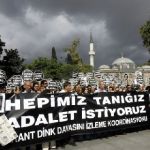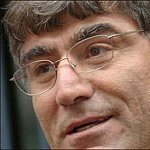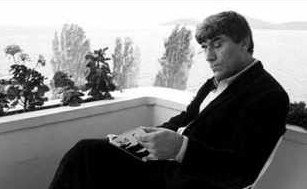In memory of Hrant Dink
Do ‘Those’ Know Why ‘They’ Are All Hrant?
Thousands of Turks who marched in the streets of Istanbul protesting against the brutal assassination of the Turkish-Armenian journalist and the editor of the AGOS newspaper Hrant Dink, were blamed by another group of people for having said “We are all Hrant, we are all Armenians”. They continued to be blamed during and after his funeral, and one year after the tragic event when the protesters gathered once again in front of the AGOS Building on January 19, 2008 at Dink’s death anniversary, they had a message for the blamers: “We are all Hrant in spite of you all.”
Let’s call the protesters as ‘they’ (who represent the WE in the above quotation) and the blamers as ‘those’ (who represent the YOU in the same quotation) in order to understand the nature of this we/you distinction in Turkey. This is a discussion on the identity of these two groups and their perceptions towards one another.
To start with, both ‘they’ and ‘those’ have existed in Turkey for a long period of time. However, ‘those’ have expressed their ideas in public, freely while ‘they’ have had to be more cautious of what they said. ‘They’ have hesitated to act together or get organized as ‘those’ have easily done so because ‘they’ could be misunderstood, judged and even threatened while ‘those’ would not. But, finally, ‘they’ were able to reveal themselves in public for the first time as a silent crowd, unfortunately only after the assassination of Hrant Dink. Their silence was indeed a scream to resist theofficial authorities that were closer to the side of the ‘those’.
Why was it Hrant Dink’s death that made this distinction of ‘those’ and ‘they’ publicly visible? In other words, did he haveto be killed? In order to find an answer, it is important to explore how the two groups view the question of Armenian genocide.
As for Hrant Dink, he believed in the Armenian genocide and was sued by the Turkish authorities since in Turkey, the claim of Armenian genocide was, and still is, interpreted as an illegal act.[i]Contrary to Mr. Dink’s belief, ‘those’ believe that the Armenian genocide is alie, purposively brought to the public to insult the ancestors of the Turkishnation. In order words, ‘those’ think, “Who dare to see the right in himself or herself to call our great grandfathers as murderers, as criminals?”
Yet, there is a small detail that ‘those’ missing their approach to ‘they’. A detail with a huge effect though, a polarizing effect on the society... Do ‘they’ call themselves as Hrant because they do believe in the genocide? No. ‘They’ is more heterogonous in its ideas when it comes to the question of Armenian genocide. Some among the ‘they’ believe it, some do not believe it, some do not know and some do not find themselves in the position of saying it is true or not. It is not even a priority issue for ‘they’ to deny or accept the Armenian genocide. Yet, ‘those’ is a highly homogenous group got stuck in the idea that the Armenian genocide is a lie and thus doesnot comprehend that ‘they’ can be a heterogonous group in viewing the Armenian question. To put it in a nutshell, it is ‘those’ who perceive ‘they’ as defenders of the Armenian genocide and position them in the opposite camp though in reality ‘they’ do not represent this idea.
Then, what do ‘they’ represent? Or what does their common ground, Hrant, refer to? Why are ‘they’ all Hrant?
The answer is to be sought in Hrant Dink’s own words and sentences as his message was to ‘those’ who passionately denied the existence of an Armenian genocide as well as to the people who argued that this genocide was unquestionably true. In other words, he accused both the Turks and the Armenians of being intolerant against each other’s ideas and beliefs. He called the two societies as clinical cases whose prescription could be nothing but a dialogue. In his call to the Armenian Diaspora, he once critically said:
Do not enchain yourselves to the year of 1915; do not commit yourselves to make the people inthe world endorse this genocide. If this is a historical pain, a pain of ourancestors, we need to carry it on our shoulders with honor in silence, withoutyammering and clamoring.[ii]
Hrant Dink even saw the humane side of the Turks who denied the Armenian genocide though he disagreed with them and wished the Armenians to see it too. In this regard, he stated that:
Armenians should try to find a self-respecting stance within the Turkish view which denies the Armenian genocide. What is this self-respecting stance? It is to stand againstthe term ‘genocide’. A Turk would think “genocide is a cursed crime and my ancestors cannot have committed this crime… because I, myself, wouldn’t.”[iii]
And from the Turks who denied the Armenian genocide, one day he wished to hear the following words:
Why are the Armenians insisting so much on this issue? We should consider this and try to empathize with them. Maybe then, we can see an honor in their view.[iv]
As to Dink’s own thought on the issue of Armenian genocide, he constantly underlined in his sentences that it was his way of interpreting history and that he was open to other interpretations:
I speak what I know about history. I say, ‘do not prohibit me from speaking’. Oppose me, try to give me true information but do not restrain me and judge me.[v]
Reading these statements by Hrant Dink, here is one answer to the question of who ‘they’ are: ‘They’ are a number of people, who understand, are aware of, and sensitive to different ideas, experiences or even feelings no matter what they argue. ‘They’ are all Hrant, because ‘they’ are ready to question the facts in spite of all ‘those’ who accept them as given. ‘They’ do see ‘those’ as an opposite camp, but not in terms of what they think; rather interms of the value that ‘they’ possess and ‘those’ lack: Tolerance.
____________________________
(*)Pelin Ayan is a PhD Candidate in Political Science, Turkey, Fulbright Visiting Researcher at Georgetown University
NOTES:
[i]How ironic that Dink was sued as hewas found guilty of insulting Turkishness in one of his articles although inreality his aim was to make a call; to the Armenians to get rid of their futilehatred against the Turks. Dink explained how he was misunderstood by theTurkish authorities in an interview, published on Zaman Gazetesi, October 17, 2005.
[ii] See Hrant Dink Interview, broadcasted on YouTube. February 12, 2007. Translated bythe author:
[iii] Ibid.
[iv] Ibid.
[v] Dink’s own words quoted in Can Dündar, ‘Buradayım ve kalmak istiyorum (I am here and want to stay)’ Milliyet Gazetesi, January 20, 2008.Translated by the author.






